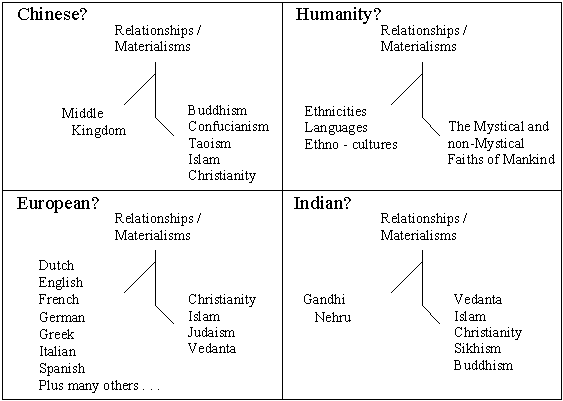Minimal Group Paradigm Studies
Two experiments by Henri Tajfel & colleagues
The Minimal Group Paradigm is a methodology employed in social psychology to investigate the minimal conditions required for discrimination
to occur between groups.
This paradigm, where a number
of assumptions, concepts, values or practices were accepted in order to better allow a view of reality in relation to the onset of human group
formation and of the appearance of discriminatory behaviours was originally planned to provide a baseline in order to test subsequently the
minimal necessary and sufficient conditions for in-group favouritism and out-group derogation to occur based on a sense of group membership.
Experiments using this approach have revealed that even arbitrary and virtually meaningless distinctions between groups
can trigger a tendency to favour one's own group at the expense others.
Amongst the earliest and most influential studies or experiments in this field were two conducted under the
overall direction of Henri Tajfel after his appointment as Professor of Social Psychology at Bristol University, England, in 1967 where
English school boys were shown to discrimate, based on a very flimsy and objectively irrelevant sense of group membership, against
a perceived out-group.
In Tajfel H, Billig M G, Bundy R P & Flament C. Social categorization and intergroup
behaviour. Eur. J. Soc. Psychol. 1:149-77, 1971. [University of Bristol, England, and
University of Aix-Marseille, France] Tajfel and his colleagues describe how they set out to investigate the minimum conditions necessary
for the establishment of a sense
of group membership that would subsequently act to provide a basis for in-group / out-group discriminatory behaviours.
Michael Billig later went on record as stating that in this study Henri Tajfel, who was of Polish-Jewish background and who
had lost many family members and friends durinmg the years 1939-1945, was investigating "How
is genocide possible?"
In an original experiment the schoolboy research subjects were randomly told that they were individually
"overestimators" or "underestimators" of the number of dots in a display.
In a second experiment such categorisation was achieved by, again randomly, telling 48, 14-15 year old, schoolboys that they were
individually members of a "Klee" group or of a "Kandinsky"
group after expressing their preferences, for a right or left hand painting, during a viewing of a succession of six pairs of un-labeled abstract
paintings about which they were only told that one was painted by Paul Klee and the other Wassily Kandinsky.
It can be suggested that there was no rationale for any of these schoolboys really feeling that they somehow "belonged" to such arbitrary,
and in many ways meaningless, groups. Each boy could not feel that they had any important shared history with other group members
who were just his school-fellows. He could not know if other boys he liked or disliked were in his "assigned" group or not.
It was found that even under very flimsy and apparently baseless assigned social categorisation into two distinct,
and previously "unheard of" social categories, in-group favouritism and out-group derogation occured in the distribution, by the schoolboys
as research subjects, of
"rewards for participation" in the study.
This held true even where there was neither
intra-group or inter-group interaction nor any opportunity to directly fulfil self-interests through such allocations
or evaluations of such "rewards for participation". The finding in these studies, which have often been replicated by other researchers,
show that under even under objectively meaningless social categorisation conditions in-group favoritism and
out-group derogation tended to routinely occur.
Before these studies by Tajfel and his colleagues, which are regarded as classic findings of Social Psychology as a branch of science,
established the Minimal
Group Paradigm it had been presumed that pre-existing individual personality or social tensions between groups were necessary to give rise
to prejudice or discrimination.
It was held by Tajfel and his colleagues that the base condition for a sense of group membership was "categorisation" itself.
Human Psychology

It is widely known that Plato, pupil of and close friend to Socrates, accepted that Human
Beings have a " Tripartite Soul " where individual Human Psychology is composed of three aspects -
Wisdom-Rationality, Spirited-Will and Appetite-Desire.
What is less widely appreciated is that such major World Faiths as Christianity, Islam,
Hinduism and Buddhism see "Spirituality" as being relative to "Desire" and to "Wrath".
|
|
![[minimal group paradigm tajfel]](../enlightenment.gif)
![[minimal group paradigm tajfel]](../enlightenment.gif)